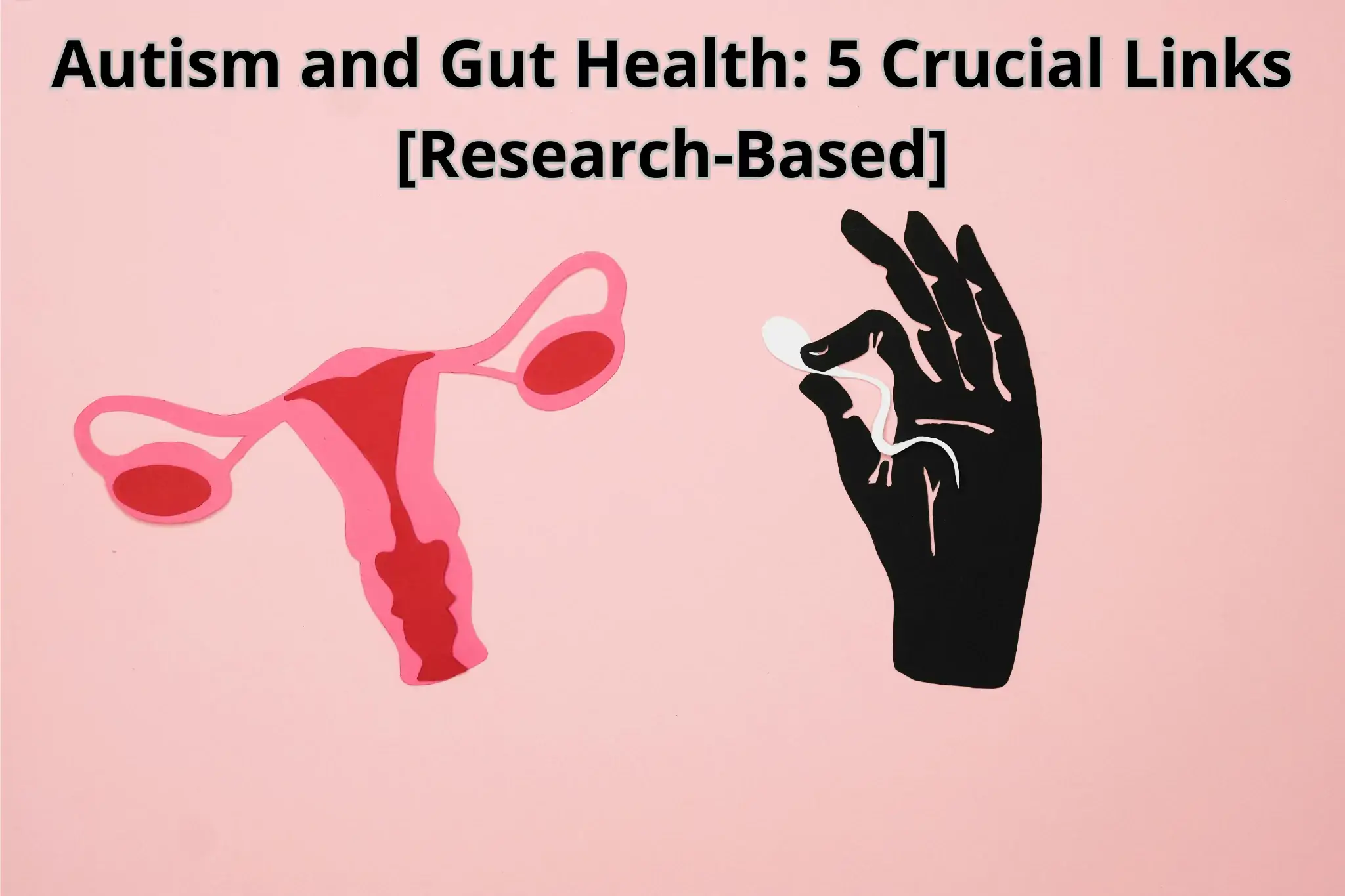With 9 years of experience in the kitchen, I’m passionate about crafting delicious recipes and sharing them with food lovers worldwide. 🍽️✨ Whether it’s a comforting homemade dish or a creative cocktail, my goal is to make cooking fun, easy, and enjoyable for everyone. Join me on this flavorful journey! 🍹🥗

Autism and Gut Health: 5 Crucial Links [Research-Based]
Autism and Gut Health: 5 Crucial Links [Research-Based]
The connection between autism and digestive wellness is a rapidly evolving area of research. Many individuals with autism spectrum disorder (ASD) experience gastrointestinal (GI) issues, leading researchers to explore the potential impact of the gut microbiome on autism symptoms. This comprehensive guide delves into the vital links between autism and gut health, offering insights based on current research and potential avenues for improvement.
What is the Autism and Gut Health Connection?
The autism and digestive wellness connection refers to the growing body of evidence suggesting a relationship between the health and composition of the gut microbiome and the symptoms and severity of autism spectrum disorder (ASD). Many individuals with autism experience gastrointestinal (GI) issues such as constipation, diarrhea, bloating, and abdominal pain at higher rates than the general population. Researchers are investigating whether these GI problems contribute to or exacerbate autism symptoms, and if targeted interventions to improve gut health can positively impact individuals with ASD. Understanding this connection is crucial for developing more holistic and effective approaches to managing autism.
Why Understanding the Autism and Gut Health Link is Important
Understanding the link between autism and digestive wellness is incredibly important for several reasons. Firstly, addressing gut issues can potentially alleviate some of the discomfort and distress experienced by individuals with autism, improving their overall quality of life. Secondly, emerging research suggests that the gut microbiome can influence brain function and behavior through the gut-brain axis. By understanding this complex relationship, we may be able to develop targeted interventions, such as dietary changes or probiotic supplementation, to modulate the gut microbiome and positively impact autism symptoms. Finally, a holistic approach that considers both neurological and gastrointestinal factors is essential for providing comprehensive and individualized care for individuals with autism. For more information on our approach to holistic care, please visit our about us page.
Benefits of Addressing Gut Health in Autism
Addressing gut health in individuals with autism can lead to several potential benefits:
- Reduced gastrointestinal symptoms (e.g., constipation, diarrhea, abdominal pain)
- Improved nutrient absorption
- Enhanced immune function
- Potential improvements in behavior, mood, and social interaction
- Overall improved quality of life
Consequences of Ignoring the Autism and Gut Health Connection
Ignoring the potential link between autism and digestive wellness can have negative consequences:
- Unresolved gastrointestinal distress
- Potential exacerbation of autism symptoms
- Nutritional deficiencies
- Reduced quality of life
- Missed opportunities for targeted interventions
5 Crucial Links Between Autism and Gut Health
Several key links have been identified between autism and digestive wellness through research:
Link #1: Gut Microbiome Composition Differences
Studies have shown that individuals with autism often have a different composition of gut bacteria compared to neurotypical individuals. This dysbiosis may involve a decrease in beneficial bacteria and an increase in potentially harmful bacteria. These differences in the gut microbiome are explored in research highlighted by the National Institute of Mental Health (NIMH). This imbalance can disrupt gut function and potentially contribute to inflammation and other health issues.
Link #2: Leaky Gut Syndrome
Increased intestinal permeability, also known as “leaky gut,” has been observed in some individuals with autism. This means that the lining of the intestines is more permeable than it should be, allowing substances like bacteria and toxins to leak into the bloodstream. This can trigger an immune response and contribute to inflammation throughout the body, potentially affecting brain function.
Link #3: Gut-Brain Axis Dysfunction
The gut-brain axis is a complex communication network that connects the gut and the brain. Disruptions in this axis, often seen in individuals with autism, can lead to imbalances in neurotransmitters and other signaling molecules that affect mood, behavior, and cognitive function. The gut microbiome plays a crucial role in modulating the gut-brain axis.
Link #4: Dietary Sensitivities and Allergies
Individuals with autism are more likely to have dietary sensitivities and allergies, which can further disrupt gut health. Common sensitivities include gluten, casein, and soy. Identifying and managing these sensitivities through dietary changes can help improve gut function and reduce inflammation.
Link #5: Inflammation and Immune Dysfunction
Chronic inflammation and immune dysfunction are often observed in individuals with autism, and the gut microbiome can play a significant role in these processes. An imbalanced gut microbiome can trigger an inflammatory response, which can affect brain development and function. Addressing gut health can help reduce inflammation and improve immune function. If you require assistance in developing a comprehensive care plan, consider exploring our services page.
Strategies for Improving Gut Health in Autism
Several strategies can be employed to improve gut health in individuals with autism. It’s important to consult with a healthcare professional or registered dietitian before making any significant changes to diet or treatment plans.
Dietary Modifications for Autism and Gut Health
Dietary modifications are often the first line of defense in addressing gut health issues in autism. Some common strategies include:
- Gluten-free, casein-free (GFCF) diet: Eliminating gluten (found in wheat, barley, and rye) and casein (found in dairy products) may help reduce inflammation and improve gut function in some individuals.
- Specific carbohydrate diet (SCD): This diet restricts complex carbohydrates and focuses on easily digestible foods to reduce inflammation and promote healing in the gut.
- Low-FODMAP diet: This diet restricts fermentable oligosaccharides, disaccharides, monosaccharides, and polyols (FODMAPs), which can cause gas, bloating, and other digestive issues.
- Focus on whole, unprocessed foods: A diet rich in fruits, vegetables, lean protein, and healthy fats can support overall gut health.
Probiotic and Prebiotic Supplementation for Autism and Gut Health
Probiotics are beneficial bacteria that can help restore balance to the gut microbiome. Prebiotics are non-digestible fibers that feed beneficial bacteria. Supplementation with probiotics and prebiotics may help improve gut function and reduce inflammation.
Addressing Underlying Infections and Inflammation for Autism and Gut Health
If underlying infections or inflammation are contributing to gut issues, addressing these issues with appropriate medical treatment is essential. This may involve antibiotics, antifungals, or anti-inflammatory medications.
Lifestyle Changes for Autism and Gut Health
Lifestyle changes such as regular exercise, stress management, and adequate sleep can also support gut health. Exercise can help improve gut motility, while stress management techniques can reduce inflammation. Contact us through our contact page to discover more holistic approaches.
Measuring the Success of Gut Health Interventions in Autism
It is crucial to have methods in place to assess if gut health interventions are proving successful for individuals with autism. This involves using a combination of objective and subjective measures.
Key Metrics for Assessing Autism and Gut Health
Several metrics can be used to track the success of gut health interventions:
- Gastrointestinal symptoms: Monitor changes in the frequency and severity of symptoms such as constipation, diarrhea, bloating, and abdominal pain.
- Stool testing: Stool tests can provide information about the composition of the gut microbiome, inflammation markers, and the presence of infections.
- Nutritional status: Assess nutrient levels through blood tests to identify any deficiencies.
- Behavioral observations: Track changes in behavior, mood, and social interaction through observation and questionnaires.
- Quality of life: Use questionnaires to assess overall quality of life and well-being.
Tools to Track Autism and Gut Health Performance
Several tools can be used to track gut health performance:
- Symptom diaries: Encourage individuals or caregivers to keep a detailed diary of gastrointestinal symptoms.
- Standardized questionnaires: Use validated questionnaires to assess gastrointestinal symptoms, behavior, and quality of life.
- Laboratory testing: Utilize stool tests, blood tests, and other laboratory tests to monitor objective markers of gut health.
- Regular check-ups: Schedule regular check-ups with a healthcare professional to monitor progress and make adjustments to treatment plans as needed.
Common Mistakes and How to Avoid Them
When addressing the autism and digestive wellness connection, certain mistakes can hinder progress and potentially cause harm. Recognizing and avoiding these pitfalls is critical.
Mistake #1: Self-Treating Without Professional Guidance
Making drastic dietary changes or starting supplements without consulting a healthcare professional or registered dietitian can be dangerous. It is essential to seek professional guidance to ensure that interventions are safe and appropriate.
Mistake #2: Ignoring Individual Needs
Every individual with autism is unique, and what works for one person may not work for another. It is important to tailor interventions to the individual’s specific needs and preferences.
Mistake #3: Expecting Immediate Results
Improving gut health takes time and patience. It is important to be realistic about expectations and to monitor progress over time.
The Future of Research on Autism and Gut Health
Research on the autism and digestive wellness connection is ongoing and rapidly evolving. Future studies will likely focus on:
AI and Autism Gut Health
Further investigation into the specific mechanisms by which the gut microbiome influences brain function and behavior in autism. This could lead to more precise and targeted interventions using AI pattern recognition and treatment plans. The application of AI in healthcare is constantly evolving, showing promise in personalized treatment.
Personalized Interventions
Developing personalized interventions based on an individual’s unique gut microbiome profile. This includes identifying specific bacterial strains that may be contributing to symptoms and developing targeted therapies to address these imbalances.
FAQ
What is the connection between autism and gut health?
The connection refers to the relationship between the health of the gut microbiome and autism symptoms. Many individuals with autism experience GI issues, and researchers are exploring the impact of the gut on autism.
How can I improve gut health in someone with autism?
Strategies include dietary modifications (e.g., GFCF diet), probiotic and prebiotic supplementation, addressing underlying infections, and lifestyle changes like exercise and stress management. Consult with a healthcare professional before making significant changes.




